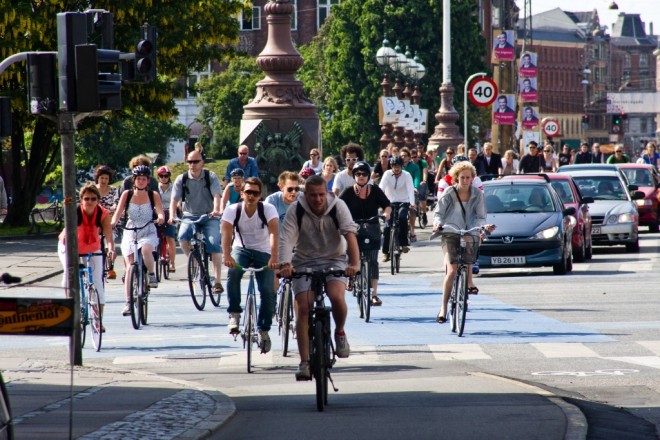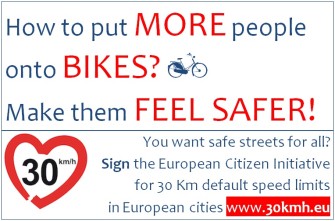
30K means more cyclists
 ECF has been supporting and will continue to promote the 30 km/h citizens’ initiative. The initiative seeks to force the European Commission to looking into the possibility of making 30 km/h the default speed in urban areas.
ECF has been supporting and will continue to promote the 30 km/h citizens’ initiative. The initiative seeks to force the European Commission to looking into the possibility of making 30 km/h the default speed in urban areas.
The European Citizen Initiative: sign here for 30K as default speed limit in cities.
You already have signed? Make one friend sign then
Why is this important? In those cities that have imposed a 30 kph limit cycling and walking have made a big comeback. This is important if we are to make active modes of transport bear the brunt of modal shift from the car. Here are two stats that provide the potential that we have to bring about this shift
- More than 30 % of trips made in cars in Europe cover distances of less than 3 km and 50 % are less than 5 km[1]
- A US study showed[2] that there are 60% of people “interested but concerned” when it comes to taking up cycling
 If we could make cities and urban areas more attractive for people who currently use their cars we can get them onto bikes quicker. There is a huge number of trips that are taken by car that should not be done, we can estimate that 30-50% of trips in urban areas could be transferred from the car to bikes and walking. And it seems that people could be prepared to do it. That 60% represents a huge potential. However a large proportion of the reasons why people do not cycle come down to safety issues.
If we could make cities and urban areas more attractive for people who currently use their cars we can get them onto bikes quicker. There is a huge number of trips that are taken by car that should not be done, we can estimate that 30-50% of trips in urban areas could be transferred from the car to bikes and walking. And it seems that people could be prepared to do it. That 60% represents a huge potential. However a large proportion of the reasons why people do not cycle come down to safety issues.
A major shift to active forms of transport that we see in cities like Copenhagen and Amsterdam is not such an impossible task. However it will require the stick of reducing and taming current motorised transport while providing the carrot of making the streets safer to those who are interested but wary of making the leap to biking. Making our urban areas 30 kph zones would help achieve this transformation, and would be a cheap transformative tactic, to boot.
This article is part of the spring campaign for 30K speed limits in line with the European citizen initiative. You can find more campaign info here
It would make the streets look safer, it would make the streets actually safer and would give advantages to biking and walking over other modes of transport. Of course there are many other benefits. A decrease in air pollution, a decrease in CO2 emissions, less congestion leaving the roads freer for those who have to use motorised transport, increase public health benefits etc. Who knows, it may even be ‘fun’ to commute to work every day.
Ceri Woolsgrove is the ECF Policy Officer for Road Safety & Technical Issues. He is from the UK and has worked extensively in London, Brighton, Liverpool (UK), Hang Zhou (China) and now in Brussels. His previous employment was for an organisation representing the transport industry in Brussels. Ceri has a Master’s degree in Globalization and International Policy Analysis from the University of Bath, and Social and Political Thought from the University of Sussex
[2] Roger Geller, Four Types of Cyclists, 2008 http://www.portlandoregon.gov/transportation/article/158497
- Log in to post comments
Contact the author
Recent news!
Upcoming events
Contact Us
Avenue des Arts, 7-8
Postal address: Rue de la Charité, 22
1210 Brussels, Belgium










